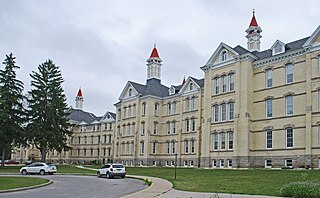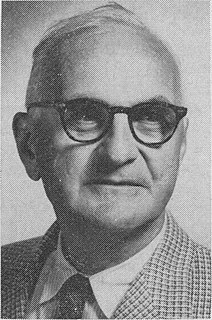
Dementia praecox is a disused psychiatric diagnosis that originally designated a chronic, deteriorating psychotic disorder characterized by rapid cognitive disintegration, usually beginning in the late teens or early adulthood. Over the years, the term dementia praecox was gradually replaced by schizophrenia, which remains in current diagnostic use.

Psychiatric hospitals, also known as mental health units or behavioral health units, are hospitals or wards specializing in the treatment of mental disorders, such as schizophrenia, bipolar disorder, and major depressive disorder. Psychiatric hospitals vary widely in their size and grading. Some hospitals may specialize only in short-term or outpatient therapy for low-risk patients. Others may specialize in the temporary or permanent containment of patients who need routine assistance, treatment, or a specialized and controlled environment due to a psychiatric disorder. Patients often choose voluntary commitment, but those whom psychiatrists believe to pose significant danger to themselves or others may be subject to involuntary commitment and involuntary treatment. Psychiatric hospitals may also be called psychiatric wards/units when they are a subunit of a regular hospital.

The Johns Hopkins Hospital (JHH) is the teaching hospital and biomedical research facility of the Johns Hopkins School of Medicine, located in Baltimore, Maryland, U.S. It was founded in 1889 using money from a bequest of over $7 million by city merchant, banker/financier, civic leader and philanthropist Johns Hopkins (1795–1873). Johns Hopkins Hospital and its school of medicine are considered to be the founding institutions of modern American medicine and the birthplace of numerous famous medical traditions including rounds, residents and house staff. Many medical specialties were formed at the hospital including neurosurgery, by Harvey Cushing and Walter Dandy; cardiac surgery by Alfred Blalock; and child psychiatry, by Leo Kanner. Attached to the hospital is the Johns Hopkins Children’s Center which serves infants, children, teens, and young adults aged 0–21.

Donald Ewen Cameron – known as D. Ewen Cameron or Ewen Cameron – was a Scottish-born psychiatrist who served as President of the American Psychiatric Association (1952–1953), Canadian Psychiatric Association (1958–1959), American Psychopathological Association (1963), Society of Biological Psychiatry (1965) and World Psychiatric Association (1961–1966). In spite of his high professional reputation, he has been criticized for, among other things, administering electroconvulsive therapy and experimental drugs, including poisons such as curare, to patients and prisoners without their informed consent, and his role in the history of the development of psychological and medical torture techniques. Some of this work took place in the context of the Project MKUltra program for the developing of mind control and torture techniques, psychoactive poisons, and behavior modification systems. Decades after his own death, the psychic driving technique he developed continued to see extensive use in the torture of prisoners around the world.

Henry Andrews Cotton was an American psychiatrist and the medical director of New Jersey State Hospital at Trenton in Trenton, New Jersey from 1907 to 1930.

Adolf Meyer was a Swiss-born psychiatrist who rose to prominence as the first psychiatrist-in-chief of the Johns Hopkins Hospital (1910-1941). He was president of the American Psychiatric Association in 1927–28 and was one of the most influential figures in psychiatry in the first half of the twentieth century. His focus on collecting detailed case histories on patients was one of the most prominent of his contributions. He oversaw the building and development of the Henry Phipps Psychiatric Clinic at Johns Hopkins Hospital, opened in April 1913, making sure it was suitable for scientific research, training and treatment. Meyer's work at the Phipps Clinic is possibly the most significant aspect of his career.
Child and adolescent psychiatry is a branch of psychiatry that focuses on the diagnosis, treatment, and prevention of mental disorders in children, adolescents, and their families. It investigates the biopsychosocial factors that influence the development and course of psychiatric disorders and treatment responses to various interventions. Child and adolescent psychiatrists primarily use psychotherapy and/or medication to treat mental disorders in the pediatric population.

The Psychiatrische Universitätsklinik Zürich is a leading psychiatric hospital in Switzerland. As a research hospital, it is associated with the University of Zürich. It is also called Burghölzli, after the wooded hill in the district of Riesbach in southeastern Zürich where it is located.
Glen Owens Gabbard is an American psychiatrist known for authoring professional teaching texts for the field. He is Clinical Professor of Psychiatry at Baylor College of Medicine in Houston, Texas, and is also training and supervising analyst at the Center for Psychoanalytic Studies in Houston.
Psychiatry is the medical specialty devoted to the diagnosis, prevention, and treatment of mental disorders. These include various maladaptations related to mood, behaviour, cognition, and perceptions. See glossary of psychiatry.
Paul Rodney McHugh is an American psychiatrist, researcher, and educator. He is currently the University Distinguished Service Professor of Psychiatry at the Johns Hopkins University School of Medicine and the author, co-author, or editor of seven books in his field. McHugh is a vocal proponent of Catholic-informed and socially conservative stances relating to sexual orientation and transgender people. Some scientists accuse McHugh of misrepresenting scientific research relating to sexual orientation.
Manfred Schanfarber Guttmacher was an American forensic psychiatrist and chief medical officer noted for his connection of psychiatry and criminal law. Among several notable cases, Guttmacher testified in the trial of Jack Ruby, and authored The Dog Must Wag The Tail: Psychiatry And The Law, America's Last King: An Interpretation of the Madness of George III and other works.

Henry Mills Hurd was the first director of the Johns Hopkins Hospital and remained in that post for 22 years (1889–1911) following which he was appointed Secretary to the Board of Trustees (1911–1927). He was also the first Professor of Psychiatry at the medical school from its opening in 1893 until 1905.
Charles Macfie Campbell (1876–1943) was a psychiatrist in the United States. He was President of the American Psychiatric Association.

Edward Cowles, an American psychiatrist, was the Medical Superintendent of the McLean Hospital in Massachusetts from 1879 to 1903. He was among the first hospital superintendents to advocate for hospital functions that encompassed patient treatment, research, and teaching.

August Hoch was a Swiss–American psychiatrist who was the third director of the New York State Psychiatric Institute in New York City from 1 February 1910 to 1 October 1917. As a neuropathologist and clinician, he exerted his influence on psychiatric developments during the early 20th century in the United States.
Edward Adam Strecker, M.D. (1886–1959) was an American physician, a psychiatric educator, a professor of psychiatry at several medical schools, and a leader in American psychiatry during the mid-twentieth century.
John Clare Whitehorn, M.D. (1894–1974) was an American psychiatric educator during the mid-20th century.
William Andrew Horsley Gantt was an American physiologist and psychologist. At the time of his death in 1980, he was one of only two surviving students of Russian physiologist Ivan Pavlov. He spent fifty-six years of his career extending Pavlov's seminal experimental research on classical conditioning. He is also recognized for his research in psychophysiology.
The Pavlovian Society, also known as the Pavlovian Society of North America, is a learned society dedicated to advancing Pavlovian psychological research, and to promoting the exchange of ideas between scientific disciplines.











